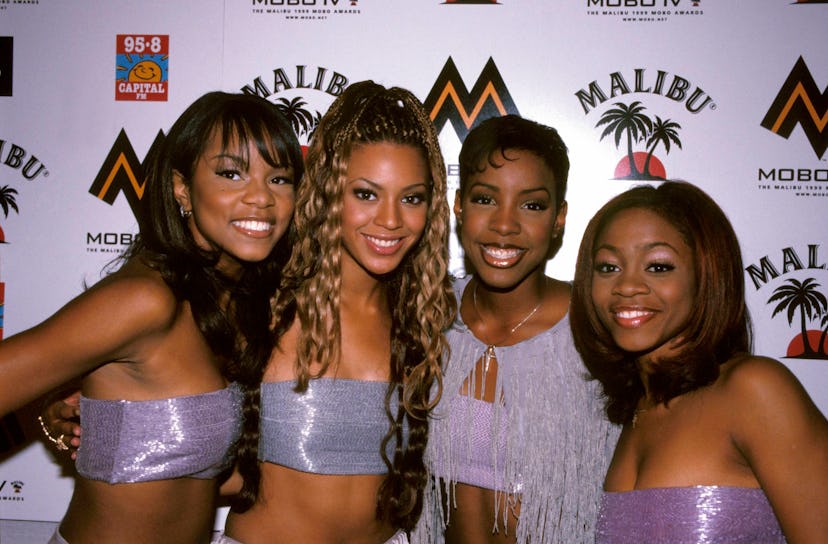Beyoncé’s Parents Made Sure Destiny’s Child Was Never Left Alone With R. Kelly
“When they went to the bathroom, Tina would go with them. They did not leave our eyes.”

Another day, another celebrity gets wrapped up in the press maelstrom following Lifetime’s release of the six-part documentary Surviving R. Kelly—this time, Beyoncé is involved. Though the documentary was just released, it’s of course not the first time that allegations of R. Kelly’s predatory behavior—including a string of illegal sexual relationships with underage women, some of whom he’s said to have held against their will in a “sex cult”—have come to light.
Indeed, there appears to have been an established whisper network among celebrities to warn one another about Kelly—something that Beyoncé’s father, Mathew Knowles, certainly seemed to confirm on Wednesday, when he told Metro that he and Beyoncé’s mother, Tina Knowles, watched their daughter and Kelly Rowland, LaTavia Roberson, and LeToya Luckett, all of whom were then in their mid-teens, like a hawk throughout Destiny’s Child’s collaboration with Kelly. (They recorded in the late ’90s—just a few years after Kelly, then 27, illegally married his protégée Aaliyah, who was then 15 years old.)
According to Mathew, he and Tina didn’t take lightly leaving them in the company of Kelly, who had reportedly made repeated requests to collab with the group. “The thing with R. Kelly was he liked to record late at night, around midnight. And what was different with his studio was that one room had a recording suite, and next door was a club, with 40 or 50 people dancing,” he explained. So he and Tina took it upon themselves to provide supervision: “I was there, and my former wife Tina was there,” he said of their time in the studio. “The girls were 15, 16. When they went to the bathroom, Tina would go with them. They did not leave our eyes.”
Still, it wasn’t just because of R. Kelly’s “reputation,” which the Knowleses apparently only began to hear rumors of at the time, which was “around 1988.” Mathew also personally rejected the song because he didn’t think it was good, nor that there was sound reason to record it. “R. Kelly was managed by Sony, by someone I won’t name, and at that time, they would almost force you to record with [their] artists,” he continued. “And R. Kelly wasn’t cheap—it was $75,000, plus travel costs, so we’re talking $100,000 for a song.”
Beyoncé has yet to comment on the situation, and she’s hardly the only celebrity to stay mum on the matter: According to the documentary’s executive producer, Dream Hampton, it was nearly impossible to get any A-lister to go on the record. “When it comes to celebrities, it was incredibly difficult to get people who had collaborated [artistically] with Kelly to come forward. We asked Lady Gaga. We asked Erykah Badu. We asked Celine Dion. We asked Jay-Z. We asked Dave Chappelle. [They’re] people who have been critical of him,” she told the Detroit Free Press earlier this month.
Still, even though Hampton later said that “turning away” is what “has allowed this to go on,” she doesn’t exactly blame them: “It’s not because they support him, it’s because it’s so messy and muddy.” (If it sounds dramatic that Hampton has also declared herself to be “at war” with the singer, who’s long put systems in place to protect him from allegations of abuse, consider that just last month, the documentary’s premiere, whose attendees included some of Kelly’s alleged survivors, had to be evacuated following a bomb threat.)
Even though Hampton and her team still managed to rack up more than 50 interviews for the documentary, which spans all the way back to 1970, the lack of celebrity participation was no doubt a blow; as the post–Harvey Weinstein reckoning and #MeToo movement have proven, it almost always takes A-listers—and hard evidence, even though that’s just as susceptible to being disregarded—for a case to garner any real public attention. And, as some have pointed out for years, that’s in part because Kelly has made a point to target those whom no one cares to defend; as the journalist Jim DeRogatis put it more than a decade after he published the first exposé of Kelly, back in 2002: “The saddest fact I’ve learned is: Nobody matters less to our society than young black women.”
R. Kelly performing in 2018.
Last year, the abundance of rumors finally began to gain some traction; the Time’s Up–backed campaign #MuteRKelly led to 10 of his concerts being canceled, and Spotify removed Kelly’s music from their official playlists and recommendation features. Still, it took until this week for Beyoncé’s father to speak out, along with Lady Gaga, who collaborated with Kelly on the song “Do What U Want (With My Body)” in 2013, and finally broke her silence in the early hours of Thursday morning. “I intend to remove this song off of iTunes and other streaming platforms and will not be working with him again,” she tweeted. “I’m sorry, both for my poor judgment when I was young, and for not speaking out sooner. I love you.”
There was, however, one celebrity (besides #MeToo founder Tarana Burke) who did go on the record for the documentary: John Legend, who’s since dismissed those who’ve called him “courageous” for his cameo, tweeting that it was an “easy decision.” “I believe these women and don’t give a fuck about protecting a serial child rapist,” he added. Then again, publicly addressing sexual assault, especially for survivors, is no easy matter, and as Hampton pointed out, speaking out against Kelly has long come with the risk of danger—one that lessens as more do dare to speak out. Those numbers have grown exponentially in the past few days; indeed, it may not be long before Beyoncé joins them herself.
Related: Lady Gaga Apologizes for Her 2013 R. Kelly Collaboration, Vows to Remove It From Streaming Services